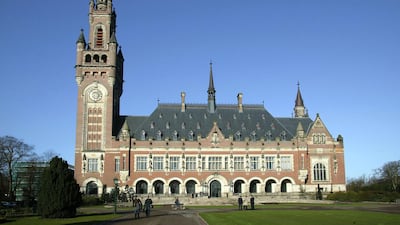The UN’s highest court ruled on Wednesday that it will proceed with Iran’s legal bid to overturn US nuclear sanctions that were reimposed by former US president Donald Trump’s administration.
International Court of Justice (ICJ) President Abdulqawi Ahmed Yusuf said the 16-justice panel rejected Washington’s procedural objections and that the court would hear a case brought by Iran in 2018.
In an hour-long ruling at the court's Great Hall of Justice at The Hague in the Netherlands, Mr Yusuf said the tribunal "finds consequently that it has jurisdiction.... to entertain the application filed by the Islamic Republic of Iran".
Iran brought the case against the US to the court in July 2018, two months after Mr Trump pulled the US out of the 2015 international nuclear deal with the Islamic republic.
Iran said the sanctions breached a friendship treaty between the two nations that was signed in 1955, when Iran was ruled by the pro-western Shah Mohammad Reza Pahlavi.
According to Tehran, sanctions reintroduced by the Trump administration caused “hardship and suffering” and were “ruining millions of lives”.
A final judgment in the case could be months or even years away.
The US responded by formally ending the 1955 treaty. It argued that the court did not have jurisdiction and should throw out the case and that sanctions were necessary because Iran posed a “grave threat” to world security.
Mr Trump unilaterally exited the 2015 nuclear deal with Iran and major world powers in May 2018, over objections from America’s European allies and other signatories to the deal.
He reimposed sanctions on Iran and companies with ties to it, notably hitting Iran’s oil sector and central bank, while major global firms halted their activities in Iran.
The deal, involving the five permanent members of the UN Security Council — Britain, China, France, Russia and the US, plus Germany — curbed Iran’s nuclear programme to stop it from producing a weapon.
The ICJ was set up after the Second World War to deal with disputes between UN member states.
The ruling comes weeks after the inauguration of President Joe Biden, who has voiced support for returning to the accord but has insisted that Tehran must stop enriching uranium and return to compliance with the deal before he lifts US sanctions.
Iranian President Hassan Rouhani on Wednesday ruled out changes to Iran’s nuclear accord with world powers and dismissed calls to broaden the terms of the deal and include regional countries, such as Saudi Arabia, which seeks a seat at the negotiating table.
Iran's Foreign Minister Mohammad Javad Zarif on Monday asked the European Union to coordinate a return to compliance with the 2015 deal by both Washington and Tehran.
The US State Department did not embrace the Iranian proposal.
Farshad Kashani, an expert in international law, said on Twitter on Wednesday that the “first ICJ ruling to apply to the USA” under the Biden administration may “have a significant effect on the implementation of secondary sanctions” against Iran.


